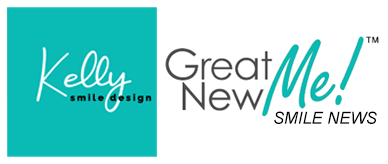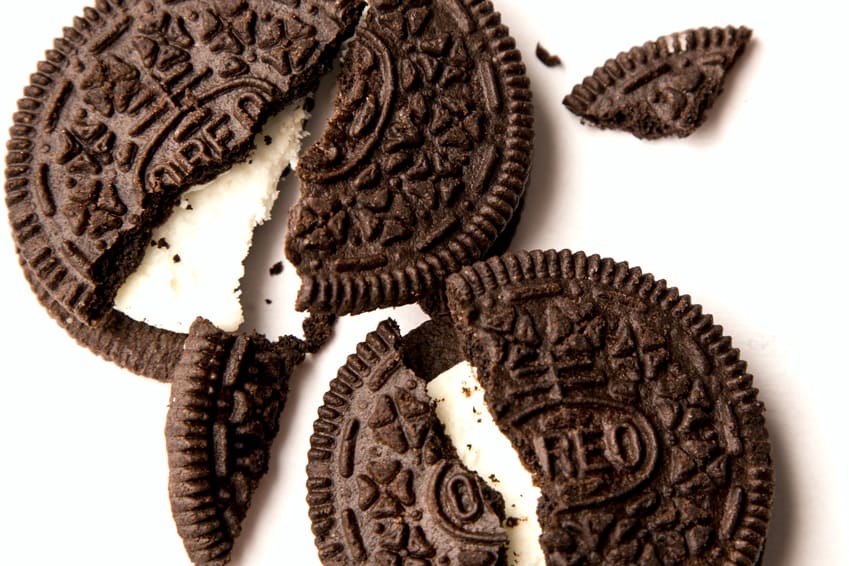John J. Kelly, DDS
Your Dental Health Blog
February 1, 2026
Welcome To Our Blog!
News and tips on your dental health and wellness. Enjoy!
Surf On Over!
Visit our website for general and cosmetic dentistry, TMJ Pain and Sleep / Airway treatments!
Pay Us A Visit!
Need a checkup and cleaning? Want a better smile? Call today!
John J. Kelly, DDS
5350 West Devon Avenue
Chicago, IL 60646
773.631.6844
IN THIS ISSUE

Loose Dentures? Don’t Panic, We Can Help!
Dentures are great technology for replacing missing teeth, but they’re also not perfect. They can be difficult to keep in, especially the lower denture. But there are ways to help you take a bite out of life better…

5 Ways Dental Veneers Can Save You A Bundle of Money and Time!
Compared with some other possible options for improving your smile, dental veneers can save you a bundle, as well as shave off the time it takes to achieve your optimum smile. Read more to find out how!
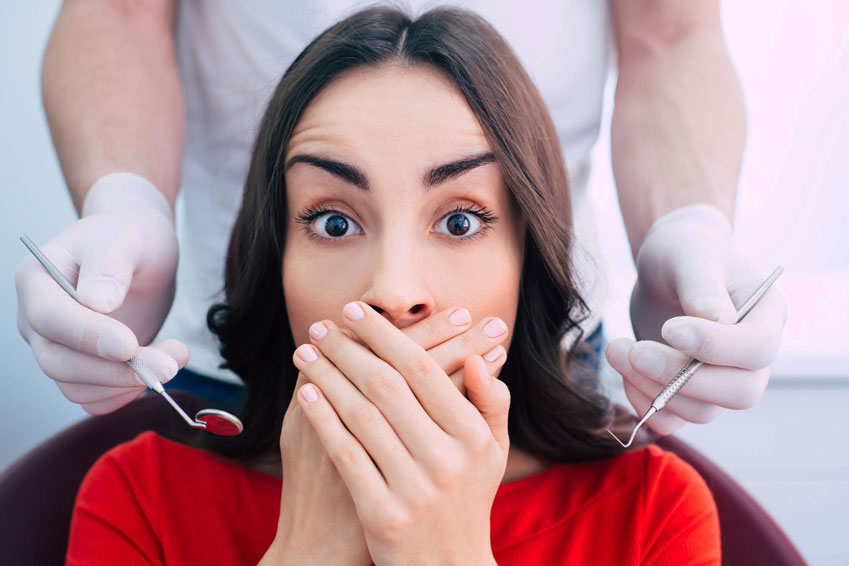
The Dentist Is Nothing To Be Scared About … So Why Are You Scared?
If you have been avoiding the dentist because of fear, you’re not alone. Dental phobias are among the most common, and in some cases they can be debilitating.

How Thrush Infections Can Affect Your Dentures
Oral thrush is problem many denture wearers suffer from — but it doesn’t have to be. Here is some helpful advice on how oral thrush can be prevented.

Can Breathing Through Your Mouth Injure Your Teeth?
Are people who breathe through their mouths more likely to have oral health issues? A recent study warns, it just might be true. If you or someone you know is a mouth breather, you should read this!
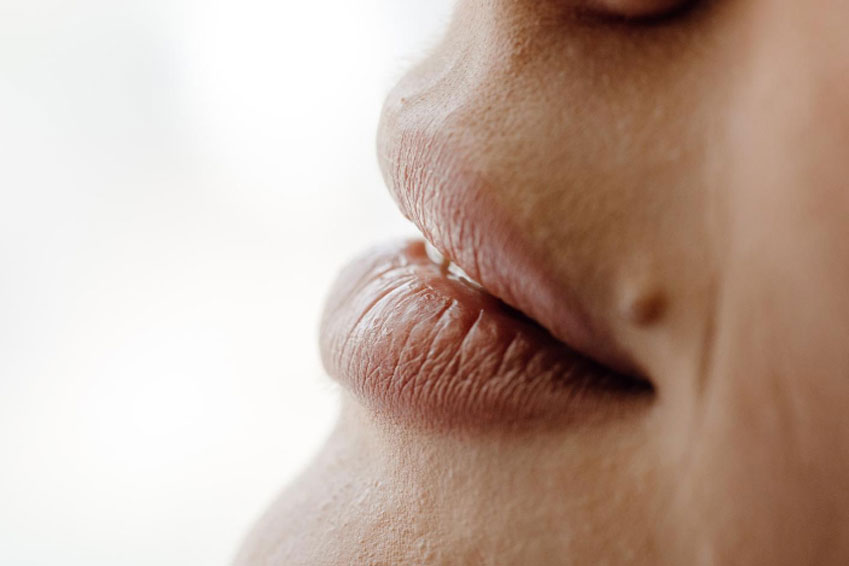
Patching Up Leukoplakia: “What’d You Call It?”
Set the scene: You bolt out of bed to get ready for your first Zoom call. In the bathroom, you manage a glance at yourself in the mirror. Opening your mouth to see how white (or yellow) your teeth are going to look on camera, you notice a thick, white/greyish patch...
Perhaps You MIssed…

Acid Alert! Five Facts About Your Oral Health and Snacking
While you may know that snacking is bad for your body, you may not realize it can affect your oral health as well.
The best way to prevent health issues and protect your teeth and gums is to remain active, eat nutritious food, and avoid unnecessary snacking. Here are the facts!
By gaining a better understanding of acid production in your mouth and learning how to effectively prevent the enamel erosion it causes, you can avoid the potential damage snacking has on oral health.
Here are some of the things you must understand in order to keep your teeth and gums healthy:
1. Acid that helps digestion can harm teeth.
Eating unhealthy food can increase your weight, especially when that food is unhealthy. However, eating does much more than adding inches to your waistline; it can also harm your teeth. Whenever you eat something, your mouth creates acid to break down the food and help with digestion. Proper digestion allows your body to absorb needed vitamins, minerals, and proteins. That same acid that helps digestion, though, can cause issues with your gums and teeth if you’re not careful. The acid in your mouth can promote the development of oral bacteria and weaken the enamel on your teeth. Consuming foods high in sugar and carbohydrates makes that acid even more dangerous to your teeth and gums.
2. The duration of eating affects acid production.
Eating frequently produces more acid, but the duration of eating can be even more harmful to your teeth and gums. When you nibble on food and sip soda or juice for an extended period as a snack, you expose your teeth and gums to acid for as long as you’re eating. That acid production then continues for at least 20 minutes after you finish eating.
3. The “right time” to indulge
Although it’s best to avoid foods high in sugar and carbohydrates, if you have a sweet tooth that you can’t ignore, there are ways of doing so that are less harmful to your teeth and gums. Rather than snacking on something sweet between meals, have your dessert following a meal because your mouth is already producing acid. This is less harmful than eating something sweet later and reactivating the acid for a new attack.

4. Brushing properly
You may be tempted to brush your teeth immediately following a meal, but it’s better to wait at least 20 minutes. When you’re eating, the enamel on your teeth is vulnerable to the acid produced in your mouth and can become softened. If you brush right away, you risk damaging or removing that weakened enamel. By waiting 20-30 minutes to brush, you’re giving the acid-filled saliva time to diminish. If you can’t brush following a meal, rinsing with water can help.

5. Combating dry mouth
Despite the fact that the acid in saliva can harm enamel, saliva is necessary to keep your mouth clean of bacteria. Saliva helps remove oral bacteria from the mouth constantly and if you suffer from dry mouth, your mouth is susceptible to higher levels of bacteria. To combat severe dry mouth caused by medical conditions or medications, talk to your dentist about the best oral rinse to replenish oral moisture.
For dry mouth caused by alcohol or caffeine consumption, consider cutting back on those drinks and consuming more water. Tobacco use can also cause dry mouth as well as damage to teeth, gums, and your overall health, so it’s best to quit.
It’s not always easy to eat healthily, but by changing some of your eating habits, you can help protect your teeth, gums, and body. If you’re someone who prefers snacking during the day, try switching from chips and sweets to healthier foods such as apples, celery or carrots. These healthy foods can help clean your teeth and gums, reduce the amount of acid produced, help you feel fuller, and improve your overall well-being.
Make sure you address any concerns you have during your next visit to a dental professional.
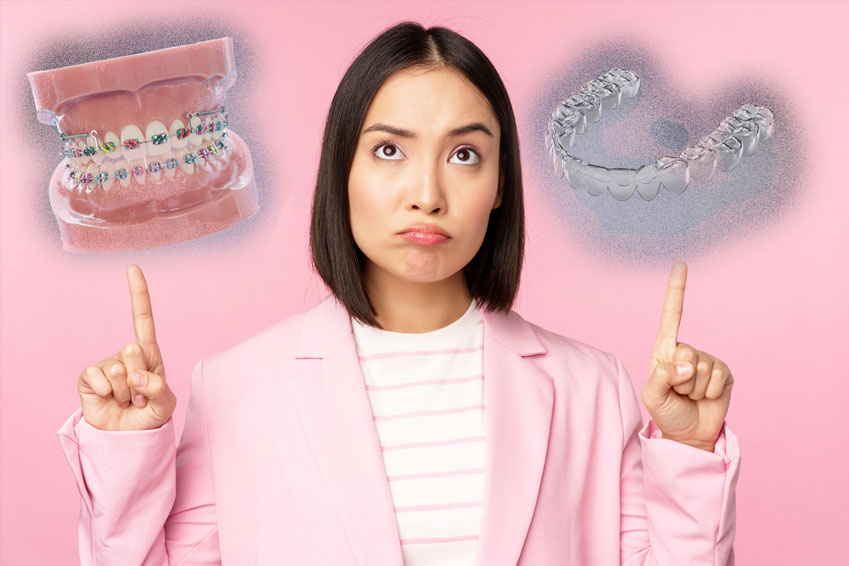
Straighter Teeth? Better Bite? What’s The Right Solution?
With the growing number of orthodontic treatment options available today, patients and practitioners can choose from several kinds of aligners. Which type is best for you?
So many braces, so little time! Naturally, the decision which system to use must be made by you and an experienced professional orthodontist and/or dentist. So much depends on the nature and severity of your condition, which may include…
- Overbite/deep bite
- Overjet
- Underbite
- Spacing issues
- Open bite
- Crowding issues
- Crossbite issues
- Teeth straightening
- A combination
In addition, your social needs, comfort and other factors play a role in which method you and your practitioner (hopefully, us) decide upon. Here are some general choices but note, there are many more…
Traditional Metal Braces
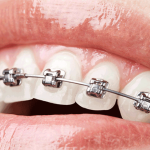 Traditional metal braces are the ones you automatically picture when someone says “braces.” Stainless steel brackets are cemented to your teeth and connected to archwires with colorful elastic rubber bands. Sturdy and reliable, these braces are capable of handling tooth and bite problems that other types of braces simply can’t.
Traditional metal braces are the ones you automatically picture when someone says “braces.” Stainless steel brackets are cemented to your teeth and connected to archwires with colorful elastic rubber bands. Sturdy and reliable, these braces are capable of handling tooth and bite problems that other types of braces simply can’t.
Self-Ligating Braces
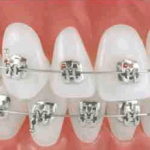 Much like traditional braces, self-ligating braces use brackets cemented to the teeth and an archwire. However, instead of elastics, a specialized clip is used, resulting in less friction on the tooth. Many orthodontists use the Damon System of self-ligating braces, which offers both traditional metal and clear brackets.
Much like traditional braces, self-ligating braces use brackets cemented to the teeth and an archwire. However, instead of elastics, a specialized clip is used, resulting in less friction on the tooth. Many orthodontists use the Damon System of self-ligating braces, which offers both traditional metal and clear brackets.
Ceramic Braces
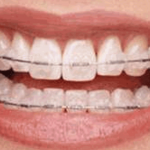 Ceramic braces use brackets made of clear ceramic instead of metal. Also known as clear braces, these braces are less noticeable than their metal counterparts. They’re also more brittle, which means they aren’t appropriate in all situations.
Ceramic braces use brackets made of clear ceramic instead of metal. Also known as clear braces, these braces are less noticeable than their metal counterparts. They’re also more brittle, which means they aren’t appropriate in all situations.
Lingual Braces
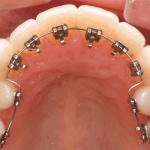 Lingual braces are traditional braces placed on the back side of the teeth. While this is appealing for cosmetic reasons, it can be more difficult for you to keep your teeth clean and for your orthodontist to make adjustments. You may also notice issues with your speech.
Lingual braces are traditional braces placed on the back side of the teeth. While this is appealing for cosmetic reasons, it can be more difficult for you to keep your teeth clean and for your orthodontist to make adjustments. You may also notice issues with your speech.
Clear Aligners
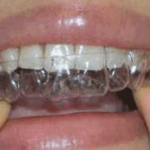 Clear aligners replace traditional brackets and arch wires with a series of computer generated acrylic trays. Each tray is worn for a few weeks at a time. Although the technology is improving, clear aligners can’t treat all orthodontic problems, and they usually require longer treatment times. But they have one definite advantage: unlike all the other types of braces, clear aligner trays are removable.
Clear aligners replace traditional brackets and arch wires with a series of computer generated acrylic trays. Each tray is worn for a few weeks at a time. Although the technology is improving, clear aligners can’t treat all orthodontic problems, and they usually require longer treatment times. But they have one definite advantage: unlike all the other types of braces, clear aligner trays are removable.
Patients aren’t restricted from sticky or hard foods and can floss easily. Practically invisible, they’re appealing if you don’t want to look like you’re wearing braces. Some brands of clear aligners, is available for teens and adults.
In recent years, mail order clear braces have become more popular as a convenient, lower-cost solution, but it is acknowledged that proper measurement and treatment of crooked teeth require careful monitoring by an experienced professional. So we do not recommend them.
Ask Your Dentist, Make A Choice – Together!
Finding the best type of braces for you or your child involves considering your orthodontic needs and your preferences regarding appearance. Complex orthodontic problems may require traditional metal or self-ligating braces, but patients with simpler issues will likely have the option of selecting more discreet styles like ceramic braces or clear aligners. Speak with your dentist first.
If you are interested in improving your smile, make an appointment with us today. Together, we can determine how best to brace yourself for the future! 🙂

The Hidden Dangers of Gum Disease
Chances are you’ve at least heard about gum disease and you know that it’s something that you don’t want in your mouth. What you may not realize, however, is just how much gum disease can put your general health at risk.

Why Tongue-Cleaning Is No Gag!
If you care about the health of your mouth, there’s one more thing you probably could be doing that you don’t – cleaning your tongue. Check out this important step for better breath, healthier teeth and gums and more!
chicago weather
MeeT DR. KELLY
Chicago dentist John J. Kelly, DDS practices restorative and cosmetic dentistry at his Chicago dental office in Edgebrook. He delivers a wide range of dental therapeutics, in addition to the treatment of Sleep Disordered Breathing including Sleep Apnea, Child Facial Development issues and TMJ/Jaw Pain.
To make an appointment with this Chicago dentist, please call Dr. Kelly’s office at 773-631-6844 or click here.
